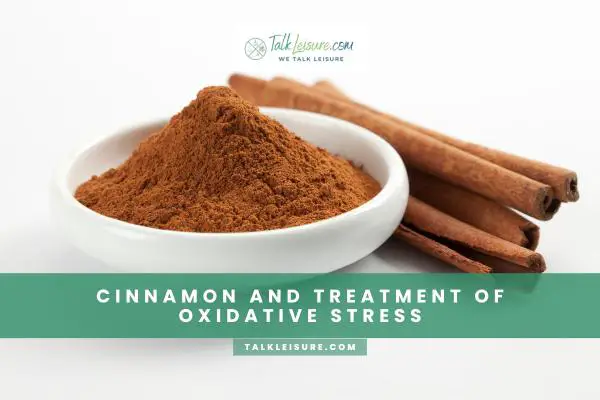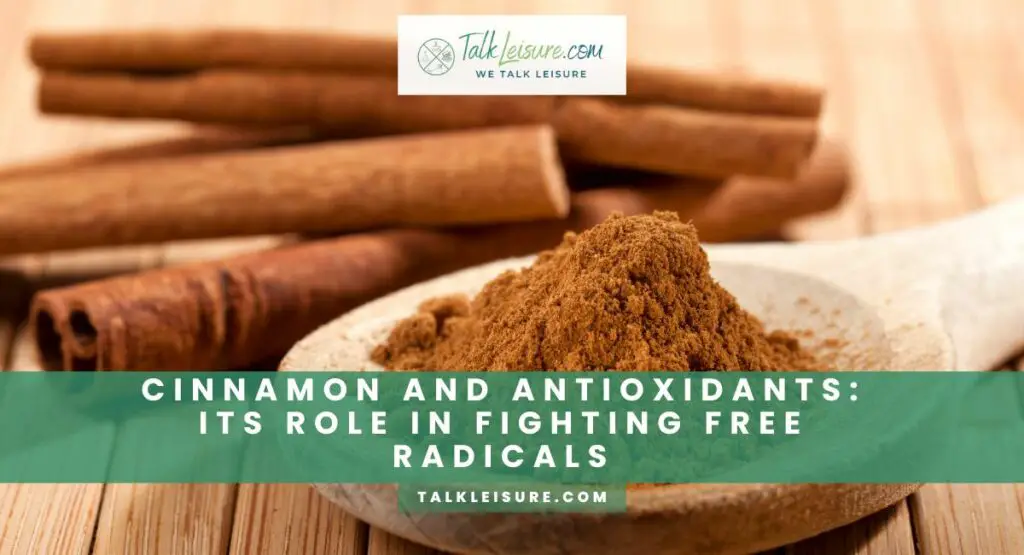In the flavorful world of spices, cinnamon stands out not only for its taste but also for its potential health benefits.
One particularly intriguing aspect is its role in battling free radicals.
These rogue molecules, known as free radicals, can cause oxidative stress in our bodies, contributing to various health issues.
This aromatic spice contains compounds that help neutralize free radicals, promoting a healthier and more resilient body.
Join us on a journey through cinnamon’s sweet and spicy world as we explore its antioxidant prowess and potential to safeguard our well-being.
Cinnamon And Health Benefits

Cinnamon is a well-known spice used for its medicinal properties for centuries.
It is packed with antioxidants, beneficial for fighting free radicals and unstable molecules that can damage cells and contribute to aging and disease.
Types Of Cinnamon And Their Components
Different types of cinnamon have distinct components, such as CD, CA, cinnamate, and essential oils like eugenol.
Cinnamon cassia contains CA oil, which treats various issues, including anti-fungal properties to prevent food spoilage and cosmetic applications.
Zeylanicum cinnamon and bark oil leaf oil are rich in eugenol, as highlighted by a study by Gotmare and Tambe in 2019.
Also, the leaf oil of Longepetiolatum cinnamon is abundant in the compound camphor and is known for its topical use in pain relief and infection treatment.
Here is a breakdown of the chemical compounds present in cinnamon oils, expressed as a percentage.
| Compound | Percentage Range |
|---|---|
| Eugenol | 70.00% to 95.00% |
| Cinnamaldehyde | 65.00% to 80.00% |
| Camphor | 60.00% |
| Cinnamyl Acetate | 42.00% to 54.00% |
(Source: Rao and Gan, 2014)
Recent studies have revealed that cinnamon has numerous health benefits. It can help reduce inflammation, lower blood sugar levels, and improve brain function, among other things.
Additionally, cinnamon has been found to have anti-cancer and anti-inflammatory properties.
Cinnamon is easy to incorporate into your diet.
It is also available in supplement form, but it is recommended to consult a healthcare professional before taking any supplements.
In conclusion, incorporating cinnamon into your diet can offer numerous health benefits due to its potent antioxidant properties.
It is a simple and tasty way to impact your health positively.
Studies On The Antioxidant Activities Of Cinnamon

Cinnamon has been studied extensively for its antioxidant properties, and researchers have discovered that it contains various compounds that act as powerful antioxidants.
One of these compounds is cinnamaldehyde, which has been found to protect against oxidative stress by inhibiting the production of free radicals.
This study concluded that cinnamon has the potential as a natural antioxidant.
Another study found that cinnamon extract could reduce oxidative stress in test-tube and animal studies, indicating that it could also have antioxidant effects in humans.
Researchers also found that cinnamon could help reduce inflammation, significantly contributing to oxidative stress.
Overall, these studies suggest that incorporating cinnamon into your diet could assist in reducing oxidative stress and support your overall health.
However, it is essential to remember that more research is necessary to determine the extent of its antioxidant effects on humans.
Does Cinnamon Have An Anti-Oxidant Effect?
Cinnamon is packed with antioxidants like polyphenols, phenolic acid, and flavonoids.
These compounds are superheroes that protect our bodies from oxidative stress caused by free radicals, reducing the risk of metabolic diseases.
Specific antioxidants in cinnamon, such as camphene, eugenol, salicylic acid, and epicatechin, have been highlighted in studies.
Modern research focuses on natural antioxidants, showcasing their effectiveness in preventing oxidative damage in our bodies through consuming foods rich in cinnamon.
The extracted oil and eugenol from cinnamon exhibit powerful antioxidant activities.
They don’t just stop there; they also help limit the buildup of nitric oxide and prevent fat peroxidation in the blood.
This is crucial because high levels of free radicals and nitric oxide can increase the risk of cardiovascular diseases, brain disorders, and even cancer.
Cinnamon is like a shield against harmful free radicals, reducing oxidative stress and contributing to overall health.
The antioxidant properties of cinnamon can protect your cells from oxidative stress caused by free radicals, ultimately leading to cellular damage and various diseases.
By incorporating cinnamon into your diet, you can counteract the effects of free radicals and protect against oxidative stress.
So, consuming cinnamon regularly could benefit your health and protect you from developing various oxidative stress-related diseases.
However, more research is required to determine the extent of cinnamon’s antioxidant effects on humans.
Cinnamon And Treatment of Oxidative Stress

Cinnamon is known for its antioxidant and anti-inflammatory properties, which makes it a powerful tool against oxidative stress caused by free radicals.
When there is an imbalance between free radicals and antioxidants in the body, it leads to oxidative stress, which is linked to various chronic diseases such as cancer, heart disease, and diabetes.
Cinnamon has been shown to reduce oxidative stress and inflammation in the body, thus preventing the onset of these conditions.
Incorporating cinnamon into your diet can be as simple as adding it to your daily smoothie, tea, or coffee.
You can also sprinkle it over your oatmeal, yogurt, or fruit for a delicious and healthy touch.
, it’s important to remember that cinnamon alone cannot cure oxidative stress-related diseases.
Maintaining a healthy lifestyle is crucial to eating a balanced diet, exercising regularly, and getting enough sleep to prevent the onset of chronic diseases.
Why Is Cinnamon A Good Antioxidant?
Cinnamon is packed with antioxidants that can help fight against free radicals. These antioxidants protect the body from oxidative stress, which can lead to various chronic conditions.
Cinnamon contains polyphenols, an antioxidant that helps reduce inflammation in the body. It also has cinnamaldehyde, a compound shown to protect against oxidative stress.
Furthermore, cinnamon has been proven to benefit heart health by reducing blood pressure and cholesterol levels, which can help prevent heart disease.
It can also help regulate blood sugar levels, making it beneficial for diabetes patients.
In conclusion, cinnamon is a good antioxidant due to its high levels of polyphenols and cinnamaldehyde, which protect against oxidative stress and inflammation in the body.
How To Use Cinnamon To Fight Free Radicals?

One tasty and simple way to fight free radicals is incorporating cinnamon into your diet.
This antioxidant-rich spice is easy to add to many dishes and drinks.
For a healthy breakfast, you can sprinkle cinnamon over your oatmeal, yogurt, or fruit. You can mix it into a smoothie or tea for a midday snack.
Or, you can add it to your coffee in the morning for an extra antioxidant boost.
Another way to use cinnamon is by making a homemade cinnamon tea. Boil a cup of water and add a cinnamon stick or a teaspoon of ground cinnamon. Let it steep for 15-20 minutes, strain, and enjoy your warm, antioxidant-rich beverage.
By incorporating cinnamon into your daily diet, you are adding a delicious flavor to your food and drinks and benefiting from its antioxidant properties.
What Are Free Radicals In The Body?
Free radicals are highly reactive and unstable molecules that can damage the cells of our body.
They are produced naturally during the body’s metabolic processes, but external factors like pollution, cigarette smoke, and radiation can also accelerate their production.
When free radicals accumulate in the body, they can cause oxidative stress and damage to our DNA, proteins, and lipids, which can lead to various chronic diseases like cancer, heart disease, and Alzheimer’s.
Antioxidants are substances that help neutralize and eliminate free radicals from the body.
They prevent the formation of harmful molecules and protect our cells from oxidative damage.
Incorporating antioxidant-rich foods like cinnamon, berries, and leafy greens into your diet can help fight free radicals and improve your overall health.
Additionally, avoiding external sources of free radicals, such as pollution and cigarette smoke, can also help reduce oxidative stress in the body.
What Causes Free Radicals In The Body?

Our body naturally produces free radicals as a byproduct of metabolism.
However, external factors such as pollution, radiation, chemical exposure, and smoking can also increase the production of free radicals.
Over time, free radicals can accumulate in the body, leading to oxidative stress and damage to cellular molecules like DNA, proteins, and lipids.
A diet high in unhealthy fats and sugars can also contribute to the production of free radicals.
Additionally, chronic stress and inflammation can cause an increase in free radical production.
These factors can lead to chronic diseases like cancer, cardiovascular diseases, and neurodegenerative disorders.
Antioxidants, such as those found in cinnamon, berries, and leafy greens, help neutralize and eliminate free radicals from the body.
Adapting a lifestyle that incorporates a balanced diet, regular physical activity, and stress management can help mitigate the effects of free radicals.
Antioxidants And Free Radicals Relationship
As mentioned earlier, free radicals can wreak havoc in our bodies by causing cellular damage that leads to various chronic diseases. That’s where antioxidants come in.
These potent natural compounds in some foods, such as cinnamon, can help neutralize free radicals and prevent them from causing harm.
Antioxidants work by donating an electron to free radicals, stabilizing them and preventing them from damaging healthy cells. Without antioxidants, free radicals can build up in the body and start a chain reaction that damages healthy cells and tissues.
Cinnamon contains high levels of polyphenols, which act as antioxidants.
It has been shown to help lower blood sugar levels, reduce inflammation, and improve heart health.
Adding cinnamon to your diet is an easy way to boost your antioxidant intake and protect your body from harmful free radicals.
How Do Antioxidants Fight Free Radicals?

Free radicals are unstable molecules that can cause damage to our cells and contribute to various chronic diseases. Antioxidants play a crucial role in protecting our bodies from free radical injury.
Antioxidants work by neutralizing free radicals, which prevents them from causing harm.
They do this by donating an electron to the free radicals, stabilizing them. By stabilizing free radicals, antioxidants help prevent them from attacking healthy cells and causing cellular damage.
Cinnamon is one example of a natural food source that contains high levels of antioxidants, specifically polyphenols.
Incorporating cinnamon into your diet can help increase your antioxidant levels, which can protect against the harmful effects of free radicals.
By fighting free radicals, antioxidants can help maintain optimal health and reduce the risk of chronic diseases.
How Can Antioxidants Benefit Our Health?

Antioxidants are essential for maintaining overall health and reducing the risk of chronic diseases.
They work by neutralizing free radicals, unstable molecules that can damage our cells.
Free radicals can contribute to various health conditions, such as cancer, heart disease, and Alzheimer’s disease.
Antioxidants combat free radicals by donating an electron and stabilizing them, preventing them from attacking healthy cells.
Incorporating high-antioxidant foods like berries, dark chocolate, and cinnamon into your diet can increase your antioxidant levels and protect against free radical damage.
Antioxidants may also improve immune function, reduce inflammation, and promote healthy aging.
By consuming antioxidant-rich foods or taking supplements, you can reap the benefits of these potent compounds and support your overall health and well-being.
Final Thoughts
Incorporating high-antioxidant foods like cinnamon can increase your body’s antioxidant levels and improve your overall health.
Cinnamon, with its potent antioxidant properties, is a flavoring agent and a powerful protector of your health.
It has been shown to reduce oxidative stress and inflammation and prevent chronic diseases such as cancer, heart disease, and diabetes.
Moreover, cinnamon can help manage blood sugar levels and improve insulin sensitivity, making it a powerful ally for those with diabetes or at risk for developing the disease.
By incorporating cinnamon into your diet or taking supplements, you can enjoy its numerous benefits and protect your health from free radical damage.
Remember, prevention is the key to healthy aging and longevity, so include cinnamon in your daily routine and reap its potent antioxidant benefits.
FAQ
What Do Antioxidants Do To Free Radicals?
Antioxidants are substances that can neutralize free radicals in our bodies.
Free radicals are unstable molecules that can cause damage to our cells, leading to oxidative stress, which can contribute to the development of chronic diseases such as cancer, heart disease, and diabetes.
Antioxidants interact with free radicals, donating an electron and stabilizing them, thus preventing them from causing damage to our cells.
What Disease Does Cinnamon Prevent?
Apart from its role in fighting free radicals, cinnamon possesses several other health benefits.
Cinnamon has been shown to have anti-inflammatory properties, which can help reduce inflammation in the body and prevent chronic diseases such as arthritis.
Moreover, Cinnamon helps regulate blood sugar levels, aiding in the prevention and management of diabetes.
Cinnamon also enhances brain function by improving cognitive abilities and reducing the risk of age-related neurodegenerative diseases such as Alzheimer’s and Parkinson’s.
Furthermore, cinnamon consumption is associated with digestive health benefits, such as reducing bloating, improving metabolism, and reducing the risk of digestive disorders.
Overall, incorporating cinnamon into your diet could be an effective way to improve your overall health and well-being while preventing several chronic illnesses.
What Are The Five Benefits Of Cinnamon?
Besides its enticing aroma and taste, cinnamon has several health benefits that are hard to ignore.
First, this spice is packed with antioxidants that help fight free radicals and reduce inflammation in the body.
Secondly, it helps regulate blood sugar levels, which benefits individuals with diabetes.
Thirdly, cinnamon is associated with improved brain function, reducing the risk of age-related cognitive decline.
Fourthly, cinnamon can help alleviate digestive problems such as bloating and improve metabolism.
Finally, cinnamon is known to have antibacterial and antifungal properties that can help fight infections.
Incorporating cinnamon into your diet is a simple and effective way to improve overall health and well-being while preventing chronic illnesses.
What Is The Role Of Cinnamon In Diabetes?
Cinnamon effectively lowers blood glucose levels in individuals with type 2 diabetes.
The spice contains antioxidants that improve insulin sensitivity, which allows the body to regulate blood sugar levels better.
This means that incorporating cinnamon into your diet can help improve your diabetes management and prevent complications associated with the condition.
Overall, cinnamon may not be a cure for diabetes, but it certainly has a vital role to play in managing the condition and improving overall health.
So, don’t be afraid to add a sprinkle of cinnamon to your meals and enjoy its many health benefits.
Best Wishes!












